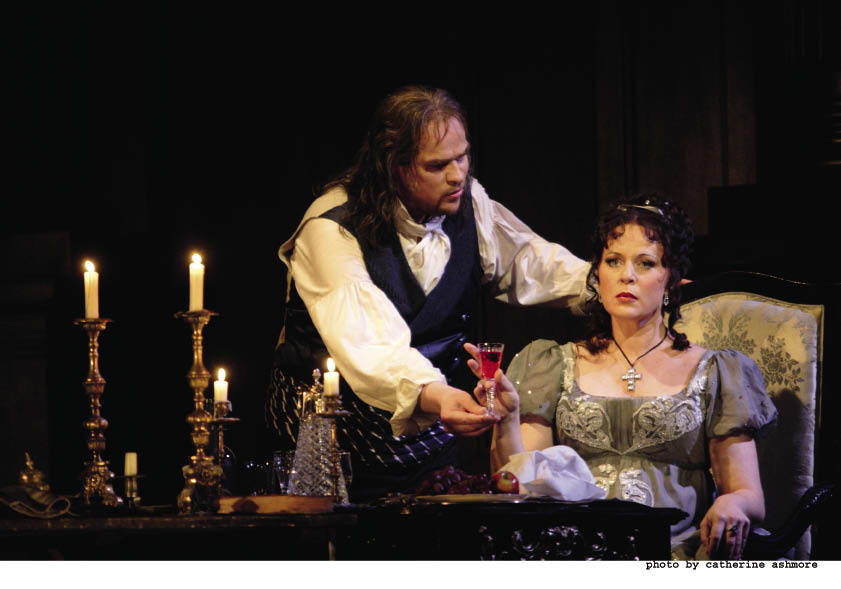Simon Boccanegra is distinctive, among all Verdi’s operas, for its darkness of tone, and for abjuring the vitality which, in his other works, the characters display, despite or because of the desperate situations which they are in.
Simon Boccanegra is distinctive, among all Verdi’s operas, for its darkness of tone, and for abjuring the vitality which, in his other works, the characters display, despite or because of the desperate situations which they are in. One comes away from this opera with the sound of baritones and basses in one’s head, no melodies — there are hardly any — and the sense that reconciliation between old foes can only be truly resolved when one of them dies. It is an impressive work, but I can’t help feeling that it owes some of its very high critical esteem at present to its sheer difference.
Even great performances of it have left me feeling depressed, while English National Opera’s new production, directed and designed by Dmitri Tcherniakov and conducted by Edward Gardner, energised me mainly by its perversity, and dismayed me mainly thanks to the provincial mediocrity of most of the singing and acting.
Verdi’s opera is set in Genoa in the 14th century, so one could take it for granted that Tcherniakov’s production would locate it in squalid surroundings in the 1960s. The curtain goes up on a street with a bar occupied by trilbied mafiosi, and with a large car, whose lights continue to flash for the whole of the 25-minute long Prologue; in the back is the ‘pirate’ Boccanegra, in jeans and a leather jacket, drinking whisky from the bottle. In such a setting no dignity is possible, though that is a key element in Verdi’s drama.
Jump 25 years, while ingenious things happen to the scenery and we are given a summary of what has happened by information slowly appearing on the drop curtain, as before each change of scene. Amelia, the only female character, is a hyperactive adolescent, her lover Gabriele Adorno a biker in full leathers. (Verdi and his librettist thought she was Boccanegra’s daughter, but according to Tcherniakov that is a fond imagining.) The music for this scene famously evokes the shimmering Genoese sea, but here we are confronted only with a wall through which characters pop, in or out.
Move to what looks like a classroom, the Council Chamber, where one of Verdi’s greatest scenes is enacted. By this time the diminution of everything that makes Boccanegra into at least a noble if very sombre work was getting to me badly. For the singers, who, according to an interview in the programme with Brindley Sherratt, are subjected to uniquely intense rehearsing by Tcherniakov, are wholly convincing as small-town local government officers. Combined with Gardner’s very restrained conducting — he only lets the score rip towards the very end — that ensures that we have no sense of a grandeur which unobtrusively figures in even the villains in Verdi’s world. Actually, the arch-villain in Boccanegra, Paolo, is portrayed by Roland Wood with such fanatical loathing for everyone else but Amelia that he emerges as by far the richest character, severely unbalancing the drama.
One more instance of Tcherniakov’s creativity will have to do: Paolo poisons Boccanegra’s water, and when Boccanegra drinks it he reflects that to a man as weary as he is even water tastes bitter — a moving moment. At ENO he picks up the glass, looks at it reflectively and puts it down without touching a drop; but still dies. Mystified? This is contemporary opera production, some of us still need to grow up.
Brindley Sherratt’s anguished Fiesco is a fairly moving study of long-sustained bitterness and grief. Rena Harms has a light and shrill voice quite unsuitable for Amelia, while poor Peter Auty has to contend not only with those leathers but also with one of Verdi’s most undercharacterised figures. Bruno Caproni began the evening in wretched voice as Boccanegra, and progressed to adequacy, vocally; but the point about this figure is his capacity to grow, as shown in the magnificence of the Council Chamber scene, and of that there was no trace. Contemporary politicians have forced us to feel that theirs is a despicable profession, but surely there is a place for aspiration and generosity of spirit on the operatic stage?
Tosca at the Royal Opera, this time round, is extremely successful, or anyway was on the opening night, when the tricky balance between the three main characters was just right. I thought Juha Uusitalo’s understated Scarpia, wonderfully well sung, was ideal, and Martina Serafin has improved immensely in the title role. Marcello Giordani is a mainly reliable Cavaradossi, at his best in the duet with Tosca in Act I. What made it a great evening, though, was the unbelievably sumptuous playing of the orchestra under Antonio Pappano, so that at times one felt the singers were hardly needed, the moods and innuendoes were caught so precisely and spookily in the pit. And it served to remind us what a consummate orchestrator Puccini was, surely as great as any operatic composer after Wagner.






Comments